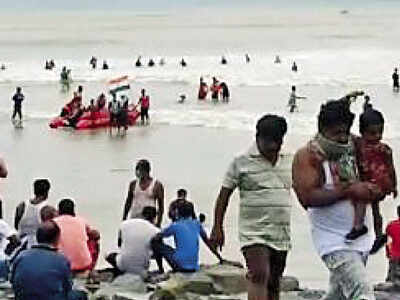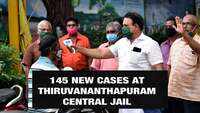
KOLKATA/DIGHA: Cornered at home by the Covid-19 pandemic for the last five months, a large section of Kolkatans and residents of the suburbs drove out to top destinations like Digha, Santiniketan, Diamond Harbour and Purulia, making last weekend one of the most crowded since Holi.
Although resorts and hotels overbooked during the Independence Day weekend is great news for a tourism industry hit hard by the pandemic, experts and officials have sounded a word of caution over the virus spread because of the large congregations.
“It’s a pleasant surprise to once again find hotels packed and people coming out in flocks in bikes and cars,” said Bipradas Chatterjee of Digha Hoteliers’ Association. “For the last five months, most hotels were either shut or operated with a handful of tourists. This weekend, the story was different. Almost 90% of hotels in Digha, Mandarmani and Tajpur are booked and the beaches are thronging with tourists of all ages. We are carrying out all sorts of sanitisation and cleaning activities in our hotel rooms to ensure prevention of contamination.”
Such was the crowd on the beaches on Saturday that cops and senior administrative officials had to rush in with loudspeakers asking holidayers to maintain social distancing and wear masks at the beach and avoid physical contact. At the New Digha beach, 10 people were prosecuted for not wearing masks.
The situation is similar at Purulia, Jhargram and Birbhum, all within four to six hours of driving distance from Kolkata, as the majority of hotels were booked between August 14 and 16. “We started receiving queries from last month. But, this weekend, the rush has been like old times. I had to refuse at least a dozen tourists as all the rooms in our hotel were booked,” said Shibashish Chatterjee of Aranya Sundari hotel in Jhargram.
“I had a Meghalaya trip planned around this time of the year, which is no longer possible,” said techie Soubhik Basu, a resident of Jadavur. “For the last five months, I have maintained norms very effectively but staying at home for such a long time was taking a toll on my mental health and hence I planned a quick trip to Mandarmani over the weekend with my family. It’s refreshing and felt good going on vacation after such a long time.” Places nearer to Kolkata were also brimming over with tourists. The riverfronts at Kolaghat, Gadiara and Diamond Harbour were packed with tourists, and several hotels clocked above-average business. “People have slowly started coming back to this tourist hub again. Our hotel was almost packed to capacity this weekend. The swimming pool and bar are closed, though,” said Sandip Sahu, manager of Punnyalakshi hotel in Diamond Harbour, around a 90-minute drive from the city.
State tourism minister Goutam Deb said people returning to popular tourist hubs was an encouraging sign for the tourism industry, but called for caution among both tourists and hoteliers, considering the pandemic. “Life moves on and so at some point, people will also leave homes and travel but we should always maintain the necessary precautions,” he said.
A virologist TOI talked to, however, said leisure travel during this period could have catastrophic affects. “Studies have proven that Covid spreads more from casual contact than contact at Covid zones like hospitals or testing centres. If people come out to travel, they must be travelling in groups inside packed air-conditioned cars, with their masks down. That is when they are most at danger,” said virologist Rahul Jain.
Analysing the psychology of people who are heading out in spite of the city’s rising Covid graph, psychologists called it an act of desperation and frustration. “This is paradoxical behaviour, which has been a part of human nature. Many of them belong to a set of people who possibly had not even ordered outside food and avoided walking past the home of a Covid patient fearing contraction. But now, when the pandemic is at its peak, they are heading out with entire families without thinking of the consequences,” said psychiatrist Siladitya Roy.
Although resorts and hotels overbooked during the Independence Day weekend is great news for a tourism industry hit hard by the pandemic, experts and officials have sounded a word of caution over the virus spread because of the large congregations.
“It’s a pleasant surprise to once again find hotels packed and people coming out in flocks in bikes and cars,” said Bipradas Chatterjee of Digha Hoteliers’ Association. “For the last five months, most hotels were either shut or operated with a handful of tourists. This weekend, the story was different. Almost 90% of hotels in Digha, Mandarmani and Tajpur are booked and the beaches are thronging with tourists of all ages. We are carrying out all sorts of sanitisation and cleaning activities in our hotel rooms to ensure prevention of contamination.”
Such was the crowd on the beaches on Saturday that cops and senior administrative officials had to rush in with loudspeakers asking holidayers to maintain social distancing and wear masks at the beach and avoid physical contact. At the New Digha beach, 10 people were prosecuted for not wearing masks.
The situation is similar at Purulia, Jhargram and Birbhum, all within four to six hours of driving distance from Kolkata, as the majority of hotels were booked between August 14 and 16. “We started receiving queries from last month. But, this weekend, the rush has been like old times. I had to refuse at least a dozen tourists as all the rooms in our hotel were booked,” said Shibashish Chatterjee of Aranya Sundari hotel in Jhargram.
“I had a Meghalaya trip planned around this time of the year, which is no longer possible,” said techie Soubhik Basu, a resident of Jadavur. “For the last five months, I have maintained norms very effectively but staying at home for such a long time was taking a toll on my mental health and hence I planned a quick trip to Mandarmani over the weekend with my family. It’s refreshing and felt good going on vacation after such a long time.” Places nearer to Kolkata were also brimming over with tourists. The riverfronts at Kolaghat, Gadiara and Diamond Harbour were packed with tourists, and several hotels clocked above-average business. “People have slowly started coming back to this tourist hub again. Our hotel was almost packed to capacity this weekend. The swimming pool and bar are closed, though,” said Sandip Sahu, manager of Punnyalakshi hotel in Diamond Harbour, around a 90-minute drive from the city.
State tourism minister Goutam Deb said people returning to popular tourist hubs was an encouraging sign for the tourism industry, but called for caution among both tourists and hoteliers, considering the pandemic. “Life moves on and so at some point, people will also leave homes and travel but we should always maintain the necessary precautions,” he said.
A virologist TOI talked to, however, said leisure travel during this period could have catastrophic affects. “Studies have proven that Covid spreads more from casual contact than contact at Covid zones like hospitals or testing centres. If people come out to travel, they must be travelling in groups inside packed air-conditioned cars, with their masks down. That is when they are most at danger,” said virologist Rahul Jain.
Analysing the psychology of people who are heading out in spite of the city’s rising Covid graph, psychologists called it an act of desperation and frustration. “This is paradoxical behaviour, which has been a part of human nature. Many of them belong to a set of people who possibly had not even ordered outside food and avoided walking past the home of a Covid patient fearing contraction. But now, when the pandemic is at its peak, they are heading out with entire families without thinking of the consequences,” said psychiatrist Siladitya Roy.

Coronavirus outbreak
Trending Topics
LATEST VIDEOS
City
 145 inmates test positive in a day, Thiruvananthapuram central prison remains Covid-19 hotbed
145 inmates test positive in a day, Thiruvananthapuram central prison remains Covid-19 hotbed  Hundreds of birds injured due to banned manjha on Independence Day in Delhi
Hundreds of birds injured due to banned manjha on Independence Day in Delhi  Karnataka: Terrifying abduction of a woman in broad daylight caught on cam
Karnataka: Terrifying abduction of a woman in broad daylight caught on cam  Independence Day 2020: Beating retreat ceremony at Attari-Wagah Border as a part of celebrations
Independence Day 2020: Beating retreat ceremony at Attari-Wagah Border as a part of celebrations
More from TOI
Navbharat Times
Featured Today in Travel
Get the app





